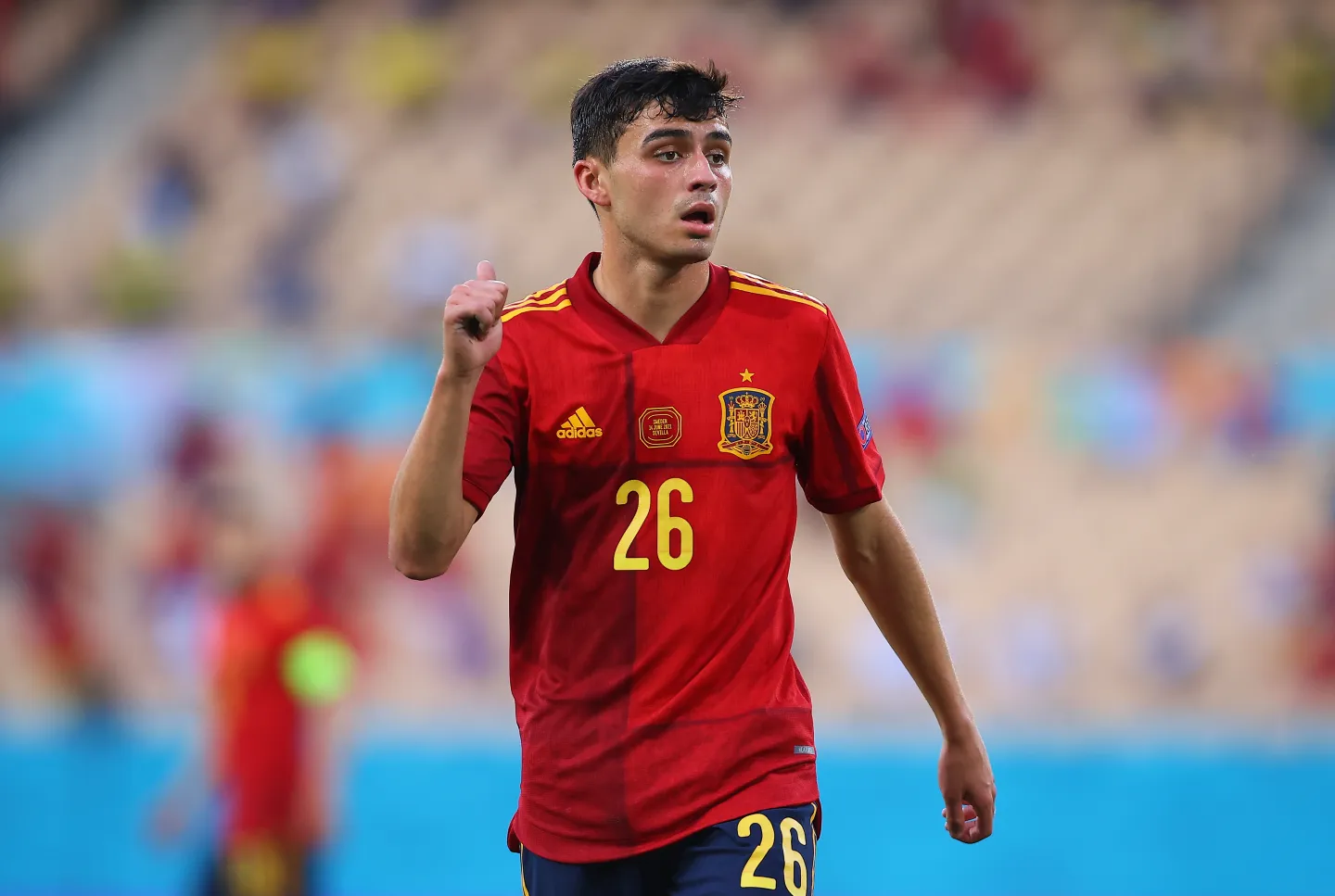Subtotal $0.00
Pedri shines with 120-pass outing
Pedri 120 passes in his latest international outing underscored why he is Spain’s metronome. The Barcelona midfielder controlled the tempo, turning possession into measured attacking moves and sustaining rhythm even as the game heated up. He was the hinge in a Spain side that pressed high, then tucked into patient phases to probe defenses. The performance was not just a tally of touches but a demonstration of influence. When Spain moved the ball wide, Pedri’s decisions arrived at speed, yet with precision, finding teammates in advanced positions. The stat line reads like a guide to his role: he is not merely a passer but the rhythm boss who sets the pace for others to follow. Pedri 120 passes is a reflection of his ability to orchestrate play, drawing out space for wingers and forwards to exploit. For Barcelona fans, the link between club and country is clear: his decisions translate into the patient buildup Xavi champions in La Liga. This outing reaffirmed his value even when the structure shifts around him. Analysts will note whether that number mirrors a sustained pattern or a one-off against a particular opponent. Regardless, the impact is tangible, and the roadmap for Barca’s midfield looks more controlled after such a display.
As the national team pressed, Pedri 120 passes became a blueprint for Spain’s strategy. He fed short, timed passes to keep pockets tight and lanes clear, then switched to longer, one-touch deliveries to destabilize compact lines. The result was a series of controlled sequences that kept the tempo within a manageable range, denying opponents easy transitions. His awareness of space allowed teammates to glide into dangerous zones without sacrificing ball retention. In this sense, the outing was not simply about volume; it was about cadence. Barcelona watchers will be keen to see how that cadence translates to the domestic stage, especially in big-title battles where every possession matters. For more on Barca’s playing philosophy, visit Barça’s official news and compare with Spain’s tactical approach via UEFA.
Midfield control and passing accuracy
Midfield control and passing accuracy became the headline after such a prolific showing. Pedri 120 passes is not simply a number; it signals a deliberate style. He thrives in sequences where space is carved through patient ball circulation. His pace of decision-making remains a weapon, enabling him to pick out teammates in advanced positions with minimal delay. The ability to shuttle the ball quickly from one corridor to another makes him dangerous in both Spain’s buildup and Barcelona’s rhythm. When opponents press high, Pedri’s short, incisive passes keep the press honest, while his quicker switches of play open channels for wingers to attack the apron of the defense. This balance between tempo and accuracy is the hallmark of his game, and it is precisely what Barcelona value when they construct phases of play that stretch rival lines.
The 120-pass mark underscores a broader pattern rather than a one-off moment. Pedri tends to accumulate touches in and around the middle third, orchestrating a sequence of passes that gradually erode opposing shapes. His vision allows teammates to exploit space as it appears, not as it is promised by a static plan. Such discipline helps Barcelona move the ball with purpose in domestic fixtures and Europe, where the margin for error is slim. The synergy with fellow midfielders—those who provide pressing intensity and positional angles of support—becomes the backbone of ball progression. For supporters curious about the tactical implications, Barca’s possession game under Xavi emphasizes patient buildup and high-tempo transitions when openings arise; see https://www.fcbarcelona.com/en/football/first-team/news for more on their philosophy, and note how Spain’s approach mirrors that patient, methodical style observed in this outing via UEFA.
Implications for Barcelona and Spain
The implications reach both club and country. A performer like Pedri 120 passes reinforces Barcelona’s insistence on a patient, possession-based approach. It validates Xavi’s philosophy that patient ball circulation creates space rather than forcing quick, unstructured transitions. Pedri’s involvement at high volume ensures that the team can ramp up tempo when required while maintaining a spine of control in midfield. For Spain, the outing demonstrates that their metronome can operate under different tactical wrinkles and still deliver consistent outputs. His ability to read the field and deliver accurate balls into dangerous zones helps unlock compact defenses that often deny space to forward lines. In systems that hinge on quick ball circulation, Pedri’s role becomes even more vital as a fulcrum around which teammates can rotate and reposition before the final pass unlocks attacking moves.
Barcelona’s coaches will watch closely how this form translates across competitions. If Pedri can sustain similar involvement across La Liga and European games, Barca’s midfield balance could tilt toward a more deliberate, possession-led style rather than quick transitions. The long-term impact could be transformative, especially as young players around him adapt to increased decision-making demands. For supporters seeking external validation, analysts will compare this outing with Spain’s recent fixtures to determine whether the high-touch, high-precision approach is a universal trait of his play or a byproduct of the opponent’s setup. Either way, the impression is clear: Pedri 120 passes is a benchmark that signals a new level of consistency for both club and country.
International duty reinforces club form
International duty has become a catalyst for club form in recent seasons, and this outing is a clear example. Pedri 120 passes boosts confidence that his style is transferable between Spain’s national team and Barcelona. The friction between different tactical demands can be unsettling, but this performance suggests a robust adaptability. Spain’s coaching staff will lean on his ability to connect with the team’s other midfielders and forwards, knowing that his decision-time can accelerate ball progression under pressure. For Barca, that confidence translates into an expectation that Pedri will carry the same tempo into domestic fixtures, elevating the collective performance. His consistency becomes a reference point for younger teammates who seek to replicate his calm under pressure, and it strengthens the argument that Pedri is among the most influential midfielders of his generation.
Beyond the immediate tactical impact, the psychological lift of such a stat line cannot be underestimated. Players feed off momentum, and Pedri 120 passes reinforces his aura as a dependable operator in demanding scenarios. Clubs and national teams with similar profiles will study this display to understand how to structure midfields to maximize a player of his profile. For more on Spain’s approach to big matches, see https://www.uefa.com/ and for Barcelona’s strategic context, visit Barça Official News.
What this means for the upcoming season
What does this mean for the upcoming season? Pedri 120 passes points toward a season where Barcelona prioritizes patient possession, careful phase-building, and selective transitions. If he maintains this level of involvement, Barca could see a more stabilized midfield core, with rhythm dictating tempo more often than reactive play. Such a shift would influence how the team structures its pressing, how quickly wingers are utilized, and how forwards exploit secondary runs created by sustained ball circulation. It could also shape recruitment priorities, with a focus on players who complement Pedri’s tempo and offer intelligent movement in the final third. The potential tactical evolution is exciting for fans who crave a stylish, technically driven product on the pitch.
There are caveats to consider. Fatigue from congested fixtures, injuries, and opponent adaptations can alter the trajectory. However, if Pedri 120 passes remains a talking point across months, it will become a yardstick by which Barca measures midfield performance. The coming season may feature explicit plans to shield him at times or to amplify his influence with specialist partners who can press aggressively while he paces the build-up. Either way, this outing provides a blueprint: high-quality possession, patient positioning, and decisive final passes are the keys to unlocking elite opposition. For readers following the season, keep an eye on how Barcelona deploys him in different competitions, and watch how Spain continues to lean on his distribution in big matches.
















